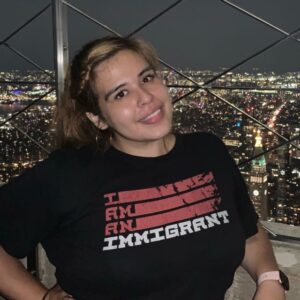 Miriam Uribe Martinez has already come a long way. And she has no intention of stopping now.
Miriam Uribe Martinez has already come a long way. And she has no intention of stopping now.
Born in Mexico, Miriam’s parents brought her to the U.S. when she was seven. She grew up in California, undocumented, like her parents. “My parents worked in factories, in people’s homes, places where they couldn’t complain about unpaid overtime or unsafe working conditions,” Miriam said. They got exploited time and time again. They wanted me to go to college, but my undocumented status and lack of funds made that very difficult.”
“Then lucky for me, just when I finished high school the California DREAM Act passed. I applied for DACA and was able to get grant money from the state to apply to college. I got accepted by the University of San Francisco but the scholarship wasn’t enough to cover my expenses—they hadn’t accounted for room and board, just tuition. I was just about to drop out because, being undocumented, I couldn’t apply for federal aid and USF didn’t provide much financial support for undocumented students. First I got upset and then I got angry, because California was providing undocumented students with the opportunity for higher education, but the university wasn’t providing them with the necessary support. So in my freshman year I wrote an op-ed for the student newspaper, ‘Undocumented and Unafraid.’ Fortunately, I got a tremendous amount of support from faculty and friends at USF, who literally helped me survive. I spent the next four years organizing on behalf of students like me and I learned that there are protections out there but most undocumented people are unaware of them. But change comes awfully slowly and in my senior year I wrote another op-ed, ‘Still Undocumented, Still Unafraid, Still Need Housing Funds’ to try to hold USF accountable.”
After graduation, Miriam realized another dream when she moved to New York City and took a job with the Workers Justice Project, where she used her experience organizing students at USF to work with other undocumented people. “I helped develop a ‘hiring hall’ for domestic workers in Williamsburg. Instead of being out on a street corner looking for day work, workers could come to the center, employers would call and there was a basic contractual arrangement. More and more employers were starting to participate and we were establishing rules and regulations to protect the workers, but ultimately we couldn’t keep going because of the toll it was taking on the organizers themselves. It’s very common with non-profits—the pay is low and there are very few boundaries on our work so people burn out after a year or two.”
 “I took that with me to my next job at TakeRootJustice, where I worked as a paralegal and advocacy coordinator on the workers’ rights team. Given my experience in a non-profit, I was really passionate about advocating for workers within the organization. When we started negotiations for a staff union, I was made a member of the bargaining team.” Miriam chuckled. “That was a wild experience. I was 24 and fearless. Anne Hathaway’s dad was the attorney representing management, and I had some heated discussions with him. But ultimately I learned how to make hard decisions, and that I couldn’t please everyone. I learned to have more grace with people, and with myself. At the end, he even offered to give me a letter of recommendation for law school.”
“I took that with me to my next job at TakeRootJustice, where I worked as a paralegal and advocacy coordinator on the workers’ rights team. Given my experience in a non-profit, I was really passionate about advocating for workers within the organization. When we started negotiations for a staff union, I was made a member of the bargaining team.” Miriam chuckled. “That was a wild experience. I was 24 and fearless. Anne Hathaway’s dad was the attorney representing management, and I had some heated discussions with him. But ultimately I learned how to make hard decisions, and that I couldn’t please everyone. I learned to have more grace with people, and with myself. At the end, he even offered to give me a letter of recommendation for law school.”
Miriam grimaced. “Then the pandemic happened. The organization wasn’t sustainable and there were major budget cuts. I got a pay cut and had to go on partial unemployment. I was helping support my grandmother in Mexico, and so I had to leave the organization and find other work. In September 2020 I got hired by the National Domestic Workers Alliance. They were starting to organize and unionize and I thought, not again! But I love my job on the mobilizing team, and I’m really happy to see NDWA’s first contract come to fruition as a proud member of CWA Local 1180!”
How did Miriam find out about SLU? “I first attended Organizing 2.0 and a co-op conference that Workers Justice Project sent me to. I had planned to become a workers’ rights lawyer, but the curriculum looked sooooo boring. My college mentor and professor, Kathleen Coll, sent me info on SLU because I was interested in workers’ rights advocacy, and in comparison to law school, SLU’s course descriptions were really interesting and exciting. I couldn’t get a federal loan due to my status, so I was really glad to read about SLU’s diversity scholarship, and I applied for that and got it. So here I am! It is honestly one of the best feelings ever to be able to come to school and not have to constantly worry about how I will pay for each semester, like I had to as an undergrad. It has helped me tremendously and SLU is setting an example on how to make higher education accessible to undocumented folks like me!”
Miriam said, “Coming to SLU to do my Master’s was one of my best decisions. I had no clue there was so much labor history with militant people of color, communists, working class folks all working together in unity. There have been so many influential people in the past—you may not know their names, but you can see the results of their work. It gives me hope that even if I don’t see my efforts as successful right now, they will have an impact in the future.” She added, “I’m lucky because my work and my studies really complement each other. I learn theories in class, and have the chance to put those theories into practice in my real life day-to-day work.”
Miriam plans to use her SLU degree and newfound knowledge to enhance her involvement in the domestic worker movement. “I’m not sure in what role, but I want to focus on the enforcement of whatever rights and legislation that the movement eventually wins. There are all these laws that are supposed to protect people but it is so difficult and it takes so long to enforce them. Employers ignore demand letters. I want to enforce workers’ rights laws and if they’re not working, figure out how to fix them.”
Asked if she has any advice for her classmates and potential SLU students, Miriam said, “I challenge my body the same way I challenge myself in my work. I do crossfit and I run, I’ve done a number of half-marathons and just ran my first full marathon. My mantra is ‘progress over perfection.’ School isn’t a sprint, it’s a marathon, and you have to learn to enjoy the process and to be comfortable with being uncomfortable.”
She added, “It’s the same with the movement: we have to embrace the process and just keep going. The whole distance, one step at a time.”



Comments
1 response to “Miriam Uribe Martinez Is Going the Distance”
Woww, Miry you are admirable !!! Congratulations daughter! You have struggled and it has not been easy, but God has seen your walk, your honesty, your passion and especially the diligence with which you act. He also knows how you have faced great challenges and He cares for you, he has not let go of your hand. He has led you to BIG VICTORIES !!! And this is the beginning of many successes to come Beautiful Princess. I love you and you have always been my greatest pride, I feel very lucky to be your Mother !! GOD WITH YOU❤